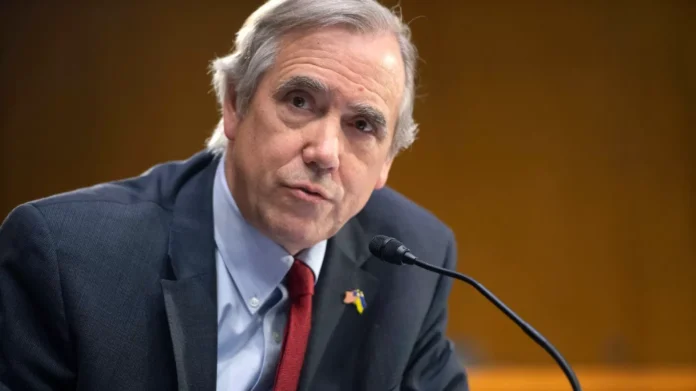Senator Jeff Merkley (D-Ore.) has recently criticized the Biden administration for not moving fast enough in deploying electric vehicle (EV) chargers across the country. During a Senate Environment and Public Works Committee hearing on Wednesday, the Federal Highway Administrator Shailen Bhatt revealed that only “dozens” but fewer than 100 EV charging points have been implemented so far, despite the funding provided by the Bipartisan Infrastructure Law.
Merkley did not hold back his disappointment and frustration, stating that the progress made in deploying EV chargers is “just pathetic.” This statement highlights the urgency of the situation and the need for immediate action to be taken in order to accelerate the deployment of EV chargers.
The Bipartisan Infrastructure Law, which was passed in November 2021, allocated $7.5 billion for the installation of EV chargers across the United States. This funding was a crucial step towards the country’s transition to cleaner and more sustainable transportation. However, the slow pace of implementation is hindering the progress and raising concerns among environmental advocates and EV enthusiasts.
The lack of EV charging infrastructure is a major barrier to the widespread adoption of electric vehicles. Without a reliable and accessible network of chargers, consumers are hesitant to make the switch to EVs, fearing they will be left stranded with no way to charge their vehicles. This fear is not unfounded, as a recent study by the Department of Energy found that the majority of EV owners face challenges in finding charging stations.
Moreover, the deployment of EV chargers is not only crucial for the adoption of electric vehicles but also for achieving the Biden administration’s goal of reaching net-zero emissions by 2050. Transportation is the largest source of greenhouse gas emissions in the United States, and transitioning to electric vehicles is a key step towards reducing these emissions.
The slow pace of EV charger deployment is also concerning given the increasing demand for electric vehicles. In 2021, EV sales in the United States reached a record high, with a 40% increase compared to the previous year. This trend is expected to continue as more automakers announce plans to phase out gas-powered vehicles and shift towards electric models.
The Biden administration must take immediate action to address the issue of slow EV charger deployment. This includes streamlining the process for installing chargers, providing incentives for businesses and individuals to invest in charging infrastructure, and working with local and state governments to identify areas with the highest demand for EV chargers.
It is also essential for the government to prioritize the deployment of EV chargers in underserved and disadvantaged communities. These communities are often disproportionately affected by air pollution and have limited access to public transportation, making the transition to electric vehicles even more critical for their health and well-being.
The deployment of EV chargers also presents an opportunity for job creation and economic growth. The installation and maintenance of charging infrastructure will require a skilled workforce, providing new job opportunities in the clean energy sector. This will not only boost the economy but also contribute to the fight against climate change.
In addition, the Biden administration must work closely with automakers to ensure that the production of electric vehicles aligns with the availability of charging infrastructure. This will prevent a situation where there are more EVs on the road than available charging stations, creating a bottleneck in the transition to electric vehicles.
The deployment of EV chargers is a crucial step towards a cleaner and more sustainable future. It is time for the Biden administration to take bold and decisive action to accelerate the deployment of these chargers. The funding provided by the Bipartisan Infrastructure Law must be utilized effectively and efficiently to ensure that the United States stays on track to meet its climate goals.
In conclusion, Senator Merkley’s criticism of the slow pace of EV charger deployment is justified and highlights the need for urgent action. The Biden administration must prioritize the deployment of charging infrastructure to support the growing demand for electric vehicles, reduce greenhouse gas emissions, and create a cleaner and healthier environment for all. Let us work together towards a greener future for generations to come.

